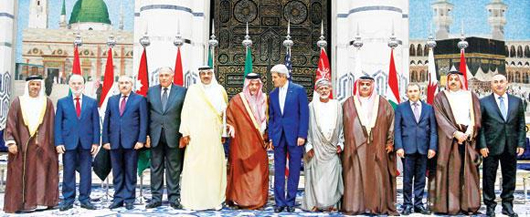Jeddah, Sep 12: The world has come together in the fight against the Islamic State (IS) terror group with the GCC led by Saudi Arabia, agreeing to join the US-led campaign.
At a crucial meeting hosted by Saudi Arabia in Jeddah on Thursday, foreign ministers of more than 10 countries vowed to crush the IS, which recently changed its name from the Islamic State of Iraq and Syria (or the Levant). The group is still known by the acronyms ISIL or ISIS.
“All of us have decided to take the fight to the ISIL camp and to defeat them through a coordinated military campaign,” said US Secretary of State John Kerry at a joint press conference with Foreign Minister Prince Saud Al-Faisal. “They are evil and have tarnished the image of the great religion of Islam.”
Kerry said Arab states would play a critical role in an anti-IS coalition but there would be no Arab or foreign soldiers on the ground. “The Iraqi army is robust and we will retrain them, recast them to take the fight to the enemy camp,” he said. “No country in the alliance is talking about sending ground troops.”
Kerry praised Saudi Arabia and its leadership for taking an unequivocal stand on the IS. “We are grateful to King Abdullah in taking the lead in hosting this meeting at such a critical time in the history of mankind,” he said. “This is a moment in history when leaders can bend the arc of history. This coalition can become a model for addressing the problem of extremism wherever it exists. We are all up to this task. We believe that we will beat back the evil of ISIS.”
He said the meeting was not limited to one state. “Libya, Lebanon, Yemen … We discussed all countries that have become safe havens for terrorists,” he said. “We will fight this evil through all available means.”
The conference was attended by Sheikh Abdullah bin Zayed Al-Nahyan of UAE, Sheikh Sabah Khaled Al-Sabah of Kuwait, Khaled Al-Attiyah of Qatar, Yousuf bin Alawi Abdullah of Oman, Sheikh Khalifa bin Ahmed Al-Khalifa of Bahrain, Ibrahim Al-Jaafari of Iraq, Nasser Judeh of Jordan, Sameh Shoukry of Egypt, Gebran Bassil of Lebanon and Mevlut Cavusoglu of Turkey.
Kerry acknowledged that the IS cannot be defeated only through military means. “A concerted effort has to be made to stop them from abusing the name of Islam,” he said. “No religion, not a great religion like Islam would ever condone the kind of acts that ISIS perpetuates.”
Prince Saud said there was total unanimity and clarity of purpose in defeating the IS. When an American journalist asked about the disagreements between the Saudi and American positions on Iraq and Syria in the past, he said: “Today, I will only talk about agreements. Nothing more, nothing else.”
Referring to US President Barack Obama’s television address to the American nation on Wednesday, Prince Saud said Obama had outlined important points. “That shows the seriousness of the US on many issues that bedevil the region,” he said.
Obama said he had ordered the US military to expand its operations against the IS. “Our objective is clear: We will degrade, and ultimately destroy ISIL through a comprehensive and sustained counter-terrorism strategy,” Obama said. “I will not hesitate to take action against ISIL in Syria, as well as Iraq.”
Obama announced that the US would ramp up military assistance to the Syrian opposition. “In the fight against ISIL, we cannot rely on an Assad regime that terrorizes its own people — a regime that will never regain the legitimacy it has lost. Instead, we must strengthen the opposition as the best counterweight to extremists such as ISIL, while pursuing the political solution necessary to solve Syria’s crisis once and for all.”
Kerry said the formation of a coalition against the IS comes on a very somber day. “Today is Sept. 11 and on this day 13 years ago, terrorists unleashed their evil designs and all of us are still facing the consequences of that act of terror,” he said.
Kerry said the participating countries also agreed to stop the flow of funds and fighters to the IS and help rebuild communities brutalized by the group’s members.
He said the Russian position that there should be a United Nations mandate to conduct aerial attacks inside Syria and Iraq was laughable.
“I must say if it weren’t so serious what’s happening in Ukraine one might almost laugh at the idea of Russia raising the issue of international law or any question of the UN,” said Kerry. “I am surprised that Russia has questioned the legality of the attacks.”
On reports about Saudi Arabia conducting training for the moderate Syrian opposition fighters, Prince Saud said all neighboring countries have been doing so for the legitimate Free Syrian Army personnel. “There is nothing new in it,” he said.
The presence of Iraqi Foreign Minister Ibrahim Al-Jaafari augured well for the coalition. Saudi Arabia has backed the formation of a new government in Iraq, which took place two days ago. The previous divisive government of Nuri Al-Maliki was seen as the lightening rod for disaffected Sunnis of Iraq to gravitate toward the IS. The new Iraqi Prime Minister Haider Al-Abadi enjoys the trust of almost all neighboring countries, including Saudi Arabia.
Kerry will meet Arab League chief Nabil Elaraby to brief the secretary general on the results of the Jeddah conference, said the Saudi Press Agency.






Comments
Add new comment